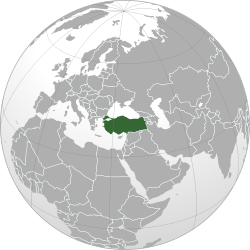Kyrgyz-Turkish Manas University
International Committee of Pre-Ottoman and Ottoman Studies (CIEPO)
Interim Symposium
On the Central Asiatic Roots of the Pre-Ottoman and Ottoman Culture
August 24-29, 2009, Bishkek, Kyrgyzstan
First Circular
We are pleased to announce that the CIEPO Symposium on the Central
Asiatic Roots of the pre-Ottoman and Ottoman Culture will be held at
Kyrgyz-Turkish Manas University, Bishkek, 24-29 August, 2009.
The Organizing Committee calls for your presentation of current
research on the Central Asiatic roots of the pre-Ottoman and Ottoman
culture related to the themes of administrative, social, economic,
military, political aspects, as well as medicine, science,
architecture, education, trade, historiography, literature and
international relations.
Individual papers will be organized into sections by the Organizing
Committee. Abstracts for individual papers should not exceed 300
words. The desirable duration of a paper presentation is 15 minutes;
it should not exceed 20 minutes. In case it becomes necessary to limit
the number of papers, the selection will be made by members of the
Organizing Committee.
Pre-organized panels/sessions and thematic workshops should consist of
two to three papers, plus an analysis of them by a discussant (or a
designated chair) of ten to fifteen minutes maximum length. The papers
should center on a single theme or question, and the panel proposal
should include an abstract (300 words maximum) for the entire panel
explaining its theme and rationale and how the individual papers
contribute to that theme, in addition to an individual abstract (300
words maximum) for each paper. In case it becomes necessary to limit
the number of papers, the selection will be made by members of the
Organizing Committee.
The participants are requested to send Registration Form by the end of
December 2008 (request by email from organizers). The deadline for
the paper titles and abstracts and/or the initial proposals and
abstracts for pre-organized sessions and workshops abstracts is by the
end of January 2009.
The symposium languages are English, French, German and Turkish.
Participants are requested to finance their own travel expenses and
accommodation. The registration fee for the symposium is 50 (USD)
which should be paid to the accounts opened on behalf of the CIEPO (we
expect to give the name of bank and account number in 2nd circular).
The CIEPO membership should be paid 10 (USD) in advance as well.
The fees are intended to cover the expenses of lunch, farewell dinner
and excursion. The details about accommodation options (with prices)
will be provided also in the 2nd circular).
Sincerely yours,
Ilhan SAHIN
On behalf of Organizing Committee
Please submit your registration form and proposals to:
E-mails: ciepomanas@gmail.com
or ilsahin40@gmail.com
Tel. 00996 (312) 49 27 83 (internal number 12 03 and 12 06)
Fax: 00996 (312) 49 27 82
Presidents
Prof. Dr. Suleyman KAYIPOV (Manas University, Rector)
Prof. Dr. Ugur ORAL (Manas University, Deputy Rector)
Organizing Committee
Prof. Dr. Dilaram ALIMOVA (Uzbekstan)
Prof. Dr. Remzi ATAOGLU (Turkey)
Prof. Dr. Tuncer BAYKARA (Turkey)
Prof. Dr. Victor BUTANAYEV (Russia)
Prof. Dr. Jean-Louis BACQUÉ-GRAMMONT (France)
Prof. Dr. Cenis CUNUSALIYEV (Kyrgyzstan)
Prof. Dr. Rémy DORE (France)
Prof. Dr. Hikari EGAWA (Japan)
Prof. Dr. Feridun EMECEN (Turkey)
Prof. Dr. Yuliy HUDYAKOV (Russia)
Prof. Dr. Mushtaq A. KAW (India)
Prof. Dr. Olcobay KARATEEV (Kyrgyzstan)
Prof. Dr. Sergei KLASTORNIY (Russia)
Prof. Dr. Dariusz KOLODZIEJCZYK (Poland)
Prof. Dr. Hisao KOMATSU (Japan)
Prof. Dr. Bulat KUMEKOV (Kazakhstan)
Prof. Dr. Heat LOWRY (USA)
Prof. Dr. Anvarbek MOKEEV (Kyrgyzstan)
Prof. Dr. Ilber ORTAYLI (Turkey)
Prof. Dr. Ajay PATNAIK (India)
Prof. Dr. Tadashi SUZUKI (Japan)
Prof. Dr. Ilhan SAHIN (Turkey), General Secretary of CIEPO
Prof. Dr. Ahmet TASAGIL (Turkey)
Excursion program being planned for the congress participants
– Nevaket – archeological complex ruins of the medieval city of
Turkic rulers of the 6th-12th century (Chuy valley)
– Site of ancient settlement Ak-Beshim – ruins of the medieval city
Suyab. The capital of Western Turks, Turgesh and Karluk states (VI-Xth
century, Chuy valley)
– Burana -archeological and architectural complex of 10th-12th
century: The capital of Karahanid state (Chuy valley)
– Suusamir- summer quarters of the Avrasya nomads
– Koksay – location of Ancient Turkic runic inscriptions of the 8th
century (Kochkor valley, Naryn oblast)
– Rock painting gallery Cholpon Ata- petroglyphs of the ancient Iron
Age and Medieval Age, Northern shore of the Issyk-Kol lake
– Royal kurgans of Issyk Kol- funeral constructions of the ancient
Saka society aristocracy
– The Ferghana Valley – historically most important staging-post on
the so-called Silk Road for goods and people travelling from China to
the Middle East & Europe




